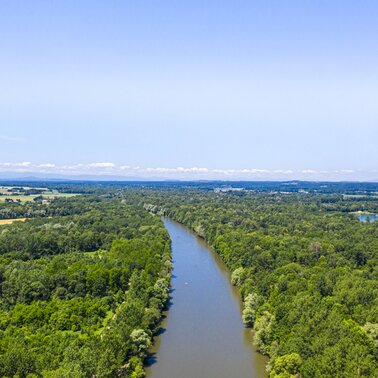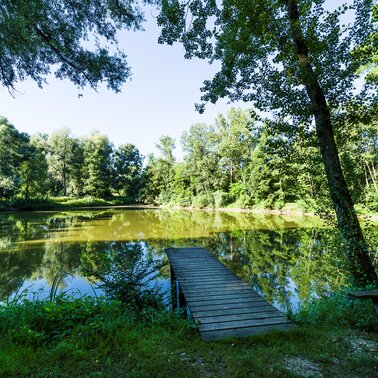

UNESCO-Biosphere Reserve Lower Murtal
Did you know that the world's first 5-country biosphere park (Austria, Slovenia, Croatia, Hungary and Serbia) is located in the Bad Radkersburg region? In June 2019, UNESCO officially declared the region "Unteres Murtal" a biosphere park.
Since 2019, Austria's second largest alluvial landscape has been recognised by UNESCO as a biosphere park. UNESCO has been awarding this recognition since 1976. Its purpose is to preserve special natural and cultural landscapes around the world. In Austria, four biosphere parks have been recognised by UNESCO: the Great Walser Valley, the Vienna Woods, the Salzburg Lungau and the Carinthian Nock Mountains, and recently also the Lower Mur Valley Biosphere Park. The Mur floodplains are such a patch of untouched nature. The sustainable development of the Lower Mur Valley habitat is thus also ensured for the future.
With the power of water
For centuries, the great water wheels of the ship mills turned on the lower Mur thanks to the inexhaustible power of the water; the ship mill in Mureck is the last one. At the ship mill you can experience the entire grinding process, from the feed to the sieve boxes, the drive via the mighty water wheel and the transmission of power through the gearbox. Enjoy the peace and quiet. Recharge your batteries in a beautiful floodplain landscape.
River’scool
The unique natural jewel is not a museum but a living and recreational space for a variety of activities - from Nordic walking to cycling. So-called River'scools panels at important places in the river basin provide information about the fauna and flora.
Come with us on an information tour. Tip: Don't forget binoculars or a magnifying glass, there is a lot to discover and marvel at! The starting point for exciting discoveries along the well-developed network of paths through the Murauen is Donnersdorf. With a bit of luck you might spot a white-tailed eagle, one of the rarest bird species in Styria.
At the Murturm in Mureck you can have a bird's eye view of the area. And not only that: rare sand martins are now finding steep walls for their up to 1-metre-long breeding tubes on the Mur again. Some transients and winter visitors such as the great egret can also be observed in the biosphere reserve.
Next stop is at the Liebmannsee before heading to the Trummerbach-Lahn, where a special fish called the mudbiter lives. It can survive for weeks in the mud, even in dried-up waters, by swallowing air and absorbing oxygen through its intestines. Continue to the Wäschbach stream, where grass snakes are often sighted. Along the Grenzmur, wagtails are often to be found. But also the protected fish species of the goldstone bittern is happy about the widening of the Mur in Sicheldorf, where it finds ideal spawning grounds.
The special world of the biosphere park in the south of the Thermen- & Vulkanland of Styria needs considerate visitors so that the untouched animal and plant world is not disturbed. Thank you!






